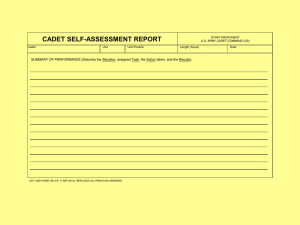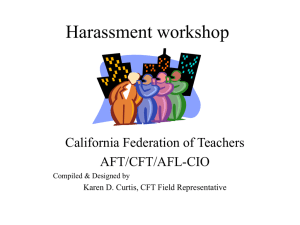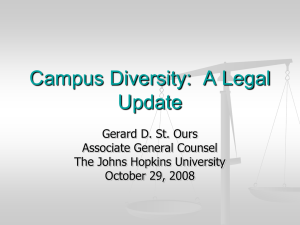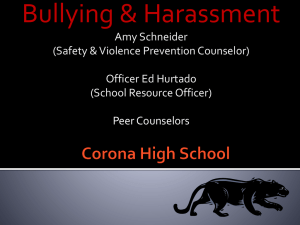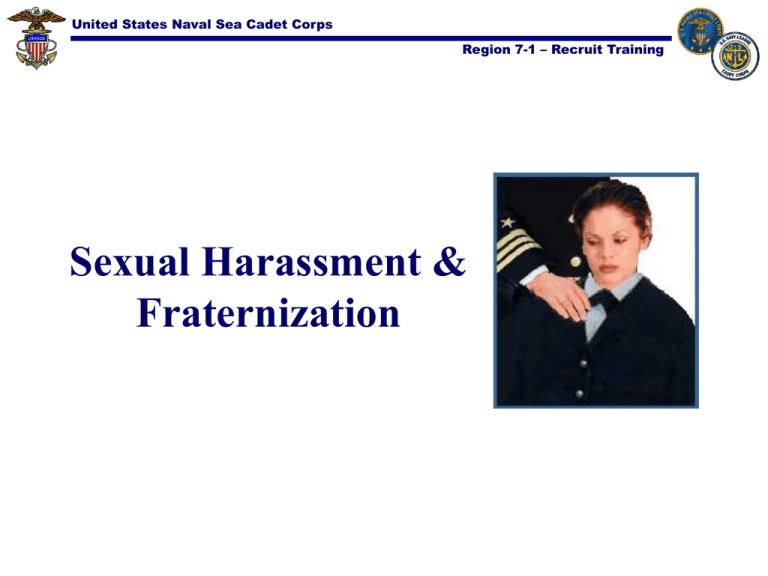
United States Naval Sea Cadet Corps
Region 7-1 – Recruit Training
Sexual Harassment &
Fraternization
United States Naval Sea Cadet Corps
Region 7-1 – Recruit Training
Introduction
• The Sea Cadets must be composed of an integrated group
of young men and women who work together to
accomplish their mission.
• There is no place in your professional or personal lifestyle
for sexual harassment.
• The key to preventing sexual harassment is education. We
need to learn to recognize, resolve, and eliminate sexual
harassment.
United States Naval Sea Cadet Corps
Region 7-1 – Recruit Training
Class Objectives
1.
2.
3.
4.
5.
6.
Identify/define sexual harassment and related terms.
Classify some behaviors into the zones of sexual
harassment.
Understand the USNSCC and the Navy’s policies on
sexual harassment.
Explain how sexual harassment affects team building
and team work.
Define and understand Fraternization in a Sea Cadet
environment.
Explain the Sea Cadet’s grievance procedures.
United States Naval Sea Cadet Corps
Region 7-1 – Recruit Training
Sexual Harassment Terms
•
•
•
•
•
•
Sexual Harassment
Sexual Discrimination
Sexual Politics
Reasonable Person Standard
Work Environment
Reprisal
The first step to recognizing, resolving, and eliminating
sexual harassment is to know what sexual harassment is!
United States Naval Sea Cadet Corps
Region 7-1 – Recruit Training
Sexual Harassment Defined
Sexual Harassment is a form of
sexual discrimination that must
meet three criteria. The
behavior must:
– Be unwelcome
– Be sexual in nature
– Occur in, or have some impact
on, the NSCC environment
Sexual harassment can be verbal,
physical, or visual in nature.
United States Naval Sea Cadet Corps
Region 7-1 – Recruit Training
Sexual Discrimination Defined
Sexual discrimination is a
behavior that denies equal
treatment because of a
person’s gender.
United States Naval Sea Cadet Corps
Region 7-1 – Recruit Training
Sexual Politics Defined
Sexual politics is using one’s sex or
sexuality to obtain special rewards or
favors. An example would be dating
a senior cadet in order to be excused
from watchstanding or KP duties.
United States Naval Sea Cadet Corps
Region 7-1 – Recruit Training
Reasonable Person Standard
A Reasonable Person
Standard (RPS) is a test used
to determine if a behavior is
sexual harassment.
United States Naval Sea Cadet Corps
Region 7-1 – Recruit Training
Work Environment
The work environment is the
place where drill, or other
Sea Cadet activities are
conducted.
United States Naval Sea Cadet Corps
Region 7-1 – Recruit Training
Reprisal Defined
A reprisal is performing or
threatening unfavorable
actions, or withholding or
threatening to withhold
favorable actions, in response
to a report of sexual
harassment.
United States Naval Sea Cadet Corps
Region 7-1 – Recruit Training
Zones of Sexual Harassment
• Zones of sexual harassment
are based on the “reasonable
person standard.”
• These zones are used to
classify behavior in relation
to sexual harassment.
• The zones can be thought of
as a traffic light: green,
yellow, and red.
United States Naval Sea Cadet Corps
Region 7-1 – Recruit Training
Green Zone
• Green zone behavior is not sexual
harassment. The following are
examples of green zone behavior:
– Performance counseling.
– Touching that could not be perceived
in a sexual way.
– Counseling on military appearance.
– Showing concern, encouragement,
giving a polite compliment, having a
friendly conversation.
United States Naval Sea Cadet Corps
Region 7-1 – Recruit Training
Green Zone
• Flirting, joking, telling someone they
look nice, or asking someone out are not
sexually harassing unless these
behaviors are used to offend, isolate,
exclude, demean, or intimidate.
• Treating people differently on the basis on gender is
not sexual harassment. An action or organizational
practice that subjugates people on the basis of their
sex, is sexual discrimination, not sexual harassment.
United States Naval Sea Cadet Corps
Region 7-1 – Recruit Training
Yellow Zone
• Yellow zone behavior could be
considered sexual harassment. The
following are examples of yellow
zone behavior:
– Violating personal “space” or
initiating suggestive touching.
– Whistling.
– Making lewd or sexually suggestive
comments.
United States Naval Sea Cadet Corps
Region 7-1 – Recruit Training
Yellow Zone
• Asking questions about personal life.
• Posting posters/calendars, making
jokes, using foul language that is
sexual in nature.
• Leering, staring.
• Making repeated requests for dates,
writing unwanted letters or poems.
• Making personal physical
adjustments that may be interpreted
as inappropriate sexual gestures.
United States Naval Sea Cadet Corps
Region 7-1 – Recruit Training
Red Zone
• Red zone behavior is always
considered sexual harassment. The
following are examples of red zone
behavior:
– Giving or getting rewards in return
for sexual favors.
– Making threats if sexual favors are
not provided.
– Using status to request dates.
United States Naval Sea Cadet Corps
Region 7-1 – Recruit Training
Red Zone
• Showing sexually explicit pictures or
remarks, writing obscene letters or
comments.
• The most severe form of sexual
harassment contstitues criminal
conduct, e.g., sexual assault (ranging
from forcefully grabbing to fondling,
forced kissing, rape, etc.)
United States Naval Sea Cadet Corps
Region 7-1 – Recruit Training
Scenario
SR Ellen Johnson is new in the Sea Cadets. Recently, a senior
cadet, PO3 Doug James, has been paying a lot of attention to
Ellen. He tells her that she's "hot," that he'd like to get
together with her, that he knows how to make her happy. SR
Johnson is flattered by the attention, but she really doesn't
like PO3 James that much, and is already bother by rumors
circulating at drill. She has asked him to stop bothering her at
Sea Cadets and to stop calling her at home. He won't take
"no" for an answer and persists in pursuing SR Johnson,
hoping she will give in.
•
•
•
Is this sexual harassment?
What should SR Johnson do?
How can this situation be resolved?
United States Naval Sea Cadet Corps
Region 7-1 – Recruit Training
Navy & NSCC Policy
• NSCC Policy on Sexual Harassment in any form is
“zero tolerance”.
• The Navy is committed to maintaining a work
environment free from unlawful discriminatory practices
and inappropriate behavior.
United States Naval Sea Cadet Corps
Region 7-1 – Recruit Training
Sexual Harassment is Prohibited
Sexual harassment in the NSCC and the Navy, for
NSCC, military and civilian personnel, is prohibited
because it:
– Causes hard feelings between shipmates
– Harms morale
– Interferes with productivity
United States Naval Sea Cadet Corps
Region 7-1 – Recruit Training
No Individual Will:
• Commit Sexual Harassment
• Take reprisal against a person providing
information on an incident of sexual
harassment.
• Knowingly make false accusations.
• While in a supervisory or command
position, condone or ignore sexual
harassment.
United States Naval Sea Cadet Corps
Region 7-1 – Recruit Training
Victims of Sexual Harassment
• Personnel who believe they are
victims of sexual harassment have
the responsibility to seek resolution
and redress without fear of reprisal.
• Submit only legitimate complaints
of sexual harassment. Persons
reporting unfound incidents will be
punished.
United States Naval Sea Cadet Corps
Region 7-1 – Recruit Training
Supervisor Responsibilities
Supervisors shall ensure that
notification of sexual harassment
can be made in a command climate
that does not tolerate acts of:
– Reprisal
– Intimidation
– Further harassment
United States Naval Sea Cadet Corps
Region 7-1 – Recruit Training
Sexual Harassment Incidents
• All reported incidents of sexual harassment will be
investigated and resolved at the lowest possible level.
• All incidents will be investigated promptly with sensitivity.
• Feedback will be provided to all affected individuals. The
complainant and the subject of the complaint may appeal
the findings.
• Counseling support and referral services are available for
personnel involved in the incident in the US Navy.
United States Naval Sea Cadet Corps
Region 7-1 – Recruit Training
Results of Sexual Harassment
USNSCC Regulations provide for a full range of
administrative and disciplinary actions, including:
–
–
–
–
Counseling
Comments on evaluations/Service Record
Referral to the Executive Director
Dismissal from the program
United States Naval Sea Cadet Corps
Region 7-1 – Recruit Training
Results of Sexual Harassment
US Navy personnel found guilty of sexual harassment may
receive one or more of the following:
–
–
–
–
Counseling
Comments on evaluations/Service Record
Punishment under UCMJ, Article 92
Separation from the Navy
United States Naval Sea Cadet Corps
Region 7-1 – Recruit Training
Results of Sexual Harassment
Military personnel found guilty of the following forms of
sexual harassment will be processed for immediate
separation:
– Actions, threats, or attempts to influence another’s career in
exchange for sexual favors
– Physical contact of sexual nature
that is in violation of the UCMJ
United States Naval Sea Cadet Corps
Region 7-1 – Recruit Training
Why is this so important?
• Teamwork is a big part of the
NSCC and the navy
environment.
• Sexual harassment can have a
dramatic impact on team
building and how teams work.
United States Naval Sea Cadet Corps
Region 7-1 – Recruit Training
Team Effects
Sexual harassment within a team can affect the whole team
by:
–
–
–
–
–
–
–
Destroying morale
Increased absenteeism
Lowered cooperation
Decreased effectiveness
Resentment among team members
Loss of personal, organizational, and public trust
More difficult decision making
United States Naval Sea Cadet Corps
Region 7-1 – Recruit Training
Individual Effects
Effects on individuals who have been sexually harassed
can also include:
–
–
–
–
Stress related illness
Deterioration of professional and personal relationships
Lowered self-esteem
Anger
United States Naval Sea Cadet Corps
Region 7-1 – Recruit Training
What Can I do?
• Take actions to foster an environment free from any form
of sexual harassment.
• Apply the Reasonable Person Standard in all conduct with
NSCC and Navy personnel.
• Report instances of sexual harassment using the chain of
command.
United States Naval Sea Cadet Corps
Region 7-1 – Recruit Training
Scenario
AN Sue Freeman and AN Mary Jones are friends. They are
both cadets in the same Sea Cadet unit. Lately, AN Freeman
has been teasing AN Jones about a male cadet in their unit.
AN Freeman claims that this cadet, PO3 Eddie Baxter, really
"likes" AN Jones and wants to get together with her. AN
Freeman constantly refers to PO3 Baxter’s physique in crude
sexual terms and makes references to his alleged romantic
history. AN Jones is very uncomfortable with this teasing and
has asked AN Freeman to stop. AN Freeman thinks it's funny
and has no intention of stopping. Besides, she thinks PO3
Baxter and AN Jones would make a good couple.
•
•
•
Is this sexual harassment?
What should AN Jones do?
How can this situation be resolved?
United States Naval Sea Cadet Corps
Region 7-1 – Recruit Training
Fraternization
• Defined as personal relationships between seniors and
subordinates that:
– Are unduly familiar
– Do not respect differences in rank or grade
• Can include relationships between shipmates in some
instances where this behavior is prohibited.
United States Naval Sea Cadet Corps
Region 7-1 – Recruit Training
Fraternization
• Fraternization could be between:
– Officer - Cadet
– Senior Cadet - Junior Cadet
– Cadet - Cadet (in some instances)
• Fraternization is gender neutral!
• Fraternization is:
– Detrimental to good order and discipline
– Violation of tradition
– PROHIBITED
United States Naval Sea Cadet Corps
Region 7-1 – Recruit Training
Fraternization
• Fraternization could result in:
– The questioning of a senior’s objectivity
– Preferential treatment
– Undermining
• Fraternization could involve:
– Dating
– Sexual Relations
– Living Together
United States Naval Sea Cadet Corps
Region 7-1 – Recruit Training
Fraternization in the Sea Cadets
• ANY relationship between an officer and a cadet!
• Some relationships or actions between cadets, including:
– ANY relationship at Boot Camp
– Public Display of Affection in Uniform
– Familiarity while at Sea Cadet Functions (Navy Ball excluded)
United States Naval Sea Cadet Corps
Region 7-1 – Recruit Training
Reporting a Grievance
• Both the US Navy and the Sea Cadets have procedures for
reporting instances of both Sexual Harassment and
Fraternization.
• Grievances should be handled at the lowest possible level
in the Chain of Command.
• There are three steps to reach a satisfactory solution:
– Directly approach the person involved
– Third Party Mediation (LPO or other member of chain of
command)
– Request Captain’s Mast if not resolved with other methods
United States Naval Sea Cadet Corps
Region 7-1 – Recruit Training
Review of Class Objectives
1.
2.
3.
4.
5.
6.
Identify/define sexual harassment and related terms.
Classify some behaviors into the zones of sexual
harassment.
Understand the USNSCC and the Navy’s policies on
sexual harassment.
Explain how sexual harassment affects team building
and team work.
Define and understand Fraternization in a Sea Cadet
environment.
Explain the Sea Cadet’s grievance procedures.
United States Naval Sea Cadet Corps
Region 7-1 – Recruit Training
Questions???


